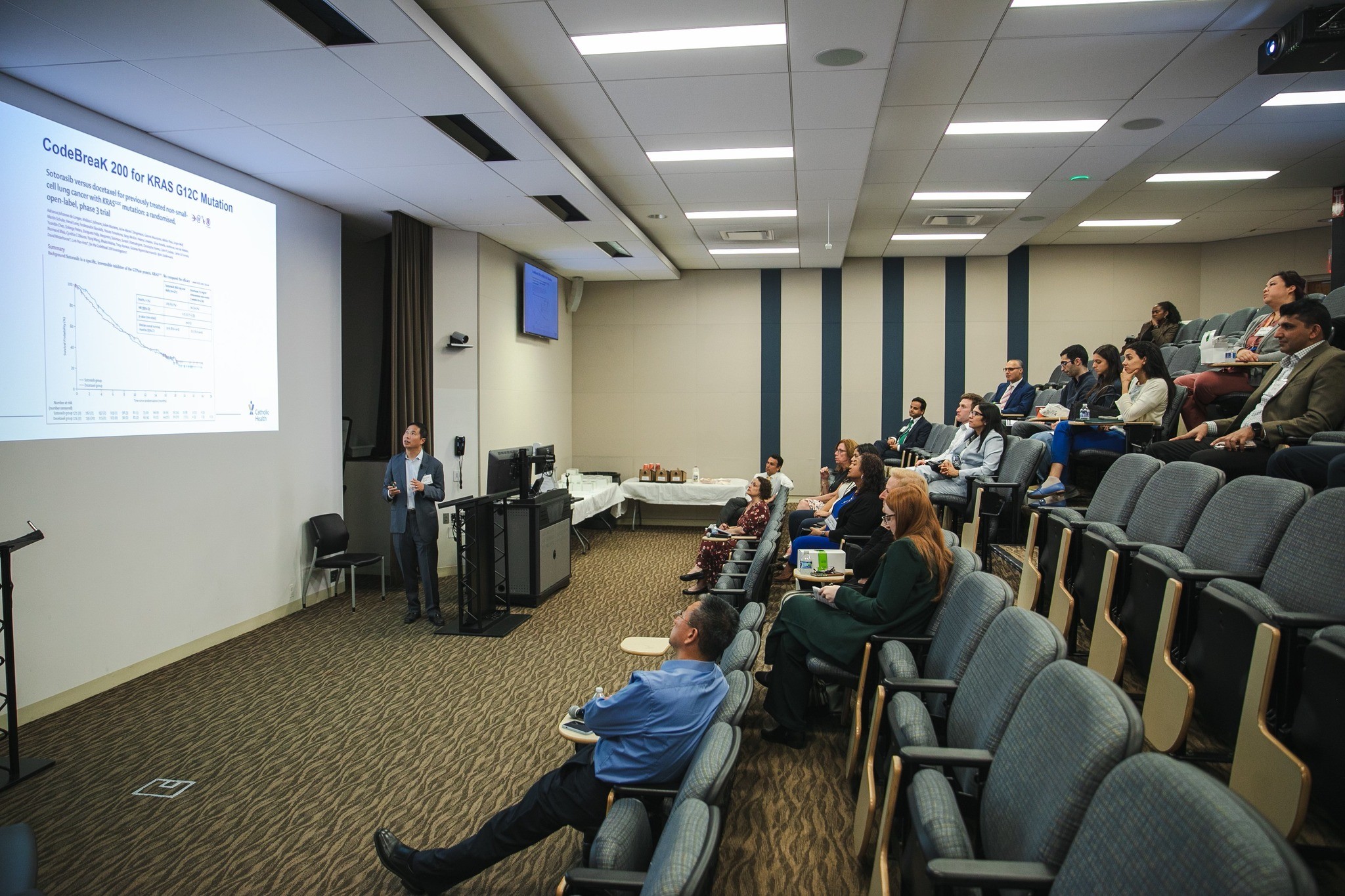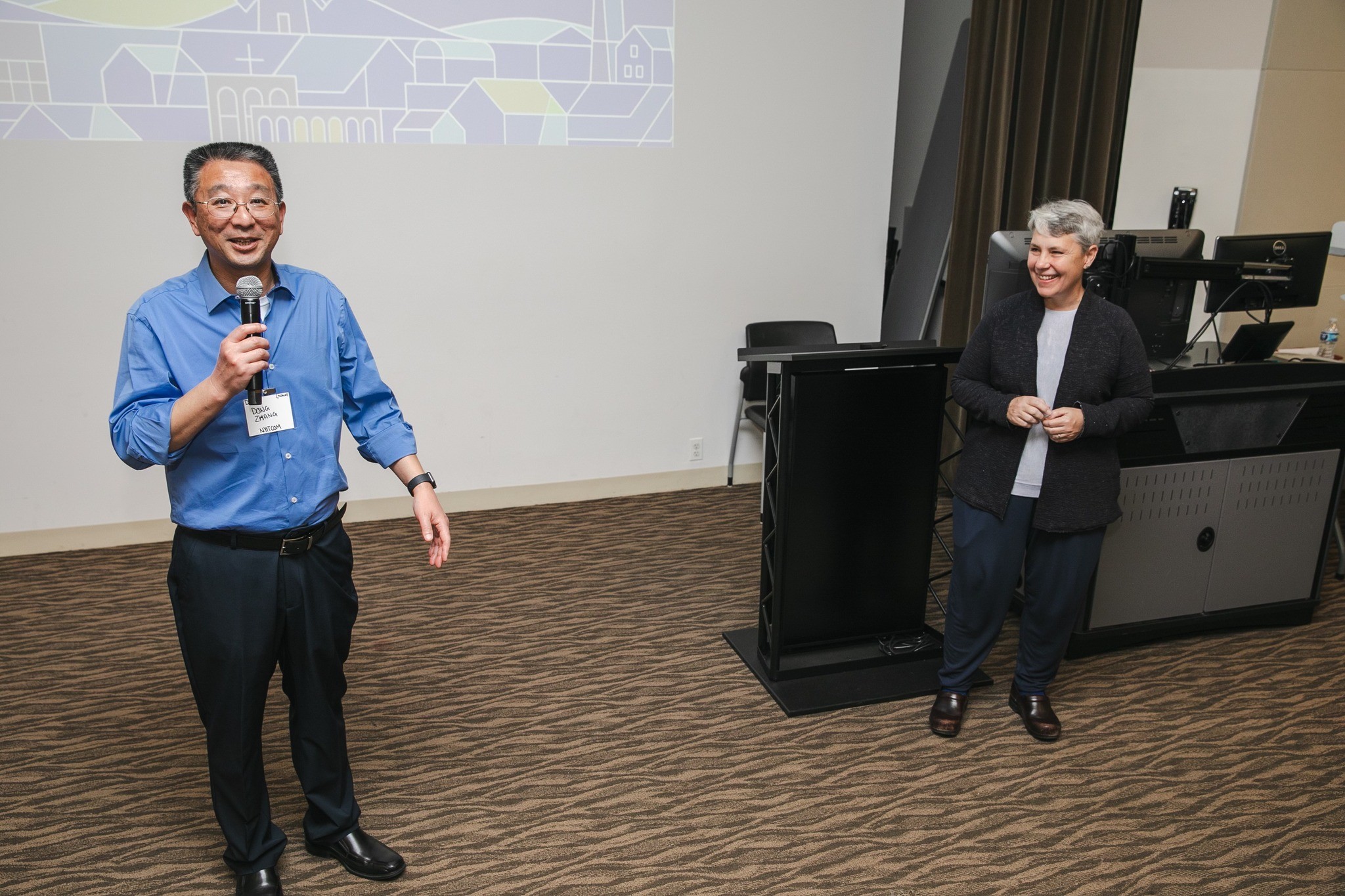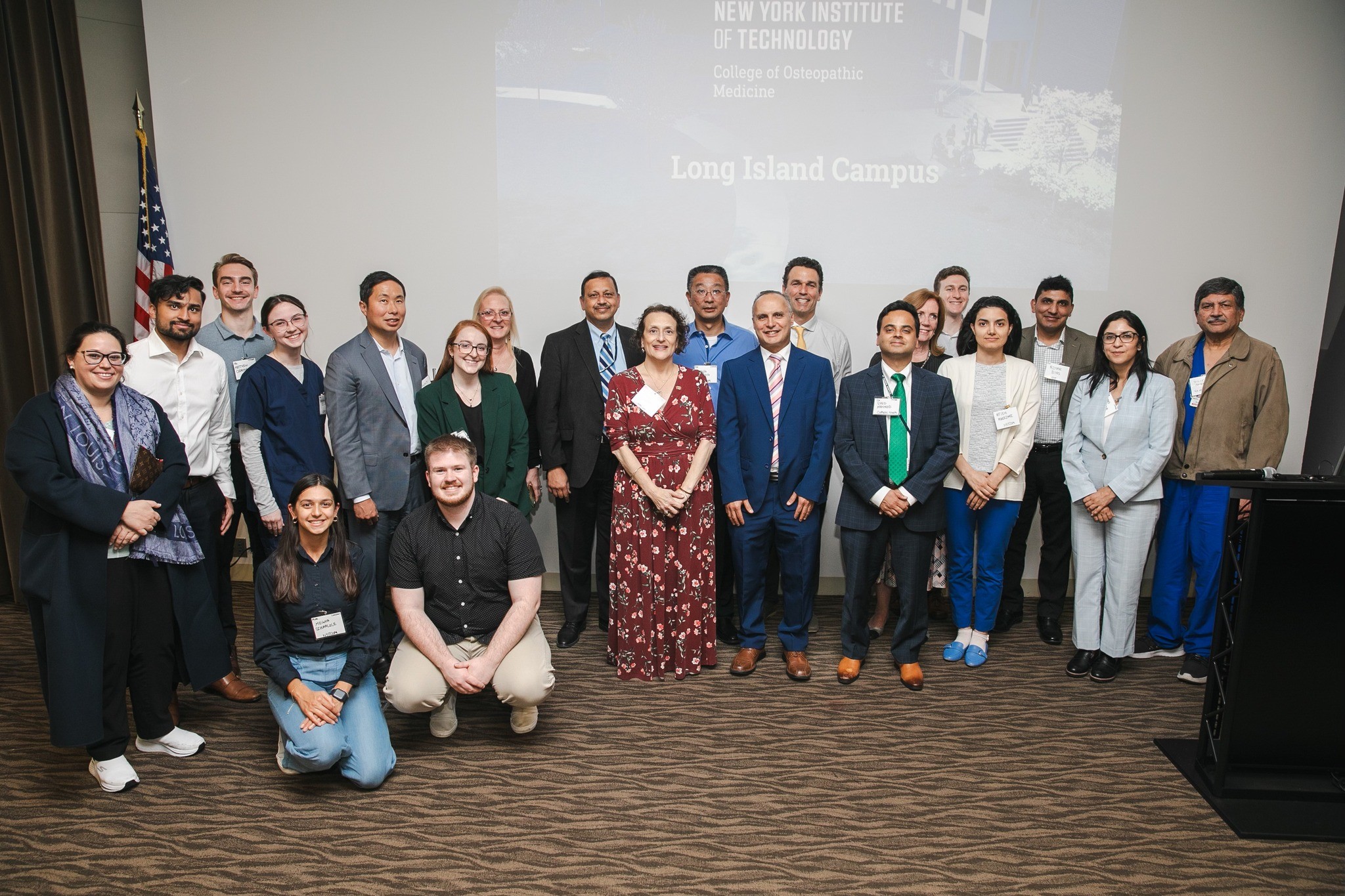Research at NYITCOM
An Environment of Discovery
Our research and development efforts at NYITCOM are on an impressive trajectory, as we continue to:
- Recruit top-level, research-intensive faculty from around the globe.
- Solidify our infrastructure with new state-of-the art technology and research equipment.
- Receive grants from such prestigious funding agencies as:
- National Institutes of Health
- National Science Foundation
- Michael J. Fox Foundation
- American Heart Association
- American Diabetes Association
NYITCOM student and faculty researchers present their important findings at major national and international conferences and in peer-reviewed scientific and medical journals.
Student Research Opportunities
Our students are actively involved in the college’s leading-edge research through fellowships, summer research programs, and the faculty-student mentoring program. In addition, through the Advanced Research Core, undergraduate students participate in NYITCOM research projects.
NYITCOM Student Research Policies And Procedures
- NYITCOM medical students may only start research/scholarly activity after successfully completing their first year, first term of classes without being in academic difficulty.
- For students doing research/scholarly activity with an NYITCOM faculty member, they must complete and submit a Student Worker Form to the Office of Research. This requirement applies no matter how small the student activity/contribution is. All research/scholarly activities are included, e.g., laboratory research, clinical research, educational research, public health or public policy research, literature review, IRB submission, data analysis, etc.
- Student Worker Forms can be obtained by contacting Ramona Buschel-Tracy (rbuschel@nyit.edu). The required information includes:
- Faculty mentor
- Project period
- Project location
- Project title/description
- Required training
- Prior to starting any research/scholarly activity, students must complete the required training for their research/scholarly activity, as determined by their research mentor and sponsoring institution.
- For students doing research at an external site, requests by the external site for a letter of good standing or other information for an NYITCOM student from NYITCOM must go through the NYITCOM administrative vetting process.
- NYITCOM Summer Research Training Certificate program
- Students who go through the NYITCOM summer research training certificate will be offered research rotations at external sites as opportunities become available.
- For the sake of streamlining, all certificate students will take the online HIPAA training course at the beginning of their research certificate and will be provided with a list of other health clearance items that may be requested by hospital rotation sites.
- Both students from Old Westbury and Jonesboro may take the summer research certificate course but we will only match the Old Westbury students to New York sites. Jonesboro will do their own matching, and will contact us if a student wants to work with a New York site.
Follow NYITCOM Research
Current Research
Research activities at NYITCOM encompass a range of areas—from basic biology, clinical medicine, and patient outcomes to health policy, global health, and medical education. Find out more about ongoing NYITCOM research in:
Recent Publications
DiFrancisco-Donoghue, Joanne, Hallie Zwibel, and William G. Werner. "Sitting for Success: A Randomized Controlled Study on the Impact of Chair Design on Muscle Stiffness and Performance in Video Gamers", Journal of Electronic Gaming and Esports 3, 1 (2025), jege.2024-0018, accessed Jun 11, 2025,https://doi.org/10.1123/jege.2024-0018
DiFrancisco-Donoghue, J., Jung, M.-K., Balentine, M. J., & Zwibel, H. (2025). Where Muscle Matters: How Regional Differences, Pain, and Gender Define Gamer Health. International Journal of Environmental Research and Public Health, 22(5), 687. https://doi.org/10.3390/ijerph22050687
Chong, L.; Husain, G.; Nasef, D.; Vathappallil, P.; Matalia, M.; Toma, M. Machine Learning Strategies for Improved Cardiovascular Disease Detection. Medical Research Archives 2025, 13(1), pp. 1-13.https://www.doi.org/10.18103/mra.v13i1.6245
Toma, M.; Mayer, J.; Bekbolatova, M.; Devine, T.; Ryo, P. Impact of Convulsive Maternal Seizures on Fetus Dynamics. International Journal for Numerical Methods in Biomedical Engineering 2024, 41(1). DOI: 10.1002/cnm.3901
International Advisory Committee on AI in Medical Education. Nino, McCoy, Masters et al. Artificial Intelligence in Medical Education: The 2025 IACAI Vision and Integration Frameworks. January 1 2025. www.medbiq.org/initiatives/international-advisory-committee-artificial-intelligence
Recent Research Grants Funded
Bernadette Riley, DO - AACOM Food As Medicine Grant ($7,500) entitled: "An Interdisciplinary approach to Food as Medicine and obesity medicine training in CME: A Culinary Medicine Hands-On Workshop: Integrating Nutrition Education Across the Medical Education Continuum". Grant period - 1/1/25-6/30/25
Jayme Mancini, DO, PhD - AOA ($100,000) entitled: "Fluid dynamics of concussion in mixed martial arts in a pilot randomized controlled trial of OMM". Grant period - 9/1/24-2/28/26
Recent Events
The Second Annual Research Symposium hosted by the NYIT Center for Cancer Research and the Cancer Institute of Catholic Health on November 7, 2024 in the Rockefeller Auditorium.
The NYITCOM Student Research Symposium hosted by the American Association of Physician Scientists-Student Chapter and the Office of Research on November 15, 2024. View Photos >
Neurobiology, Glycobiology, and Genomics in Brain Disorders
Heparan sulfate is a sugar molecule that covers the surface of all human cells and plays an important role in the pathogenesis of multiple brain disorders, such as Alzheimer's disease and Parkinson's disease. Long genes (> 100 kilobases) are specifically expressed in the brain and show unique genomic and epigenomic features and are associated with brain disorders. The Zhao Lab aims to understand the role of heparan sulfate and long genes in brain health and diseases, particularly in Alzheimer's disease, Parkinson's disease, and Kallmann syndrome.
Primary investigator: Assistant Professor, Ying-tao "Jerry" Zhao, Ph.D.
Neurobiology and Thyroid Hormone Signaling in Glial Tissues in Health and Disease
Astrocytes are among the most abundant cells in the central nervous system and are involved in neurotransmitter and ion homeostasis, synaptic and neuronal modulation, and blood-brain barrier maintenance. The Stout Lab studies the molecular mechanisms by which astrocytes mediate cognition, memory formation and recall, and neuronal support for brain function in health and disease. We use extremely advanced microscopy tools and cell culture techniques to elucidate the subcellular mechanisms of hypothyroidism, autism spectrum disorders, traumatic brain injury, and neurodegenerative diseases such as Alzheimer's disease.
Primary investigator: Associate Professor, Randy Stout, Ph.D.
Digital Pathology and Immunohistochemistry
The Petcu Lab focuses on mechanisms of neural and bone tissue regeneration, including 3D bioprinting methods. In addition, the Petcu Lab is experienced in quantitative digital pathology and immunohistochemistry for clinical diagnostic and research in histopathology within classical and hybrid digital environments.
Primary investigator: Associate Professor, Eugen Petcu, M.D., Ph.D.
Olfactory deficits in Autism Spectrum Disorder
Differences in sensory function have been documented for a number of neurodevelopmental conditions, and autism is characterized by challenging sensory experiences that significantly impact the diagnosed individuals. The Otazu Lab focuses on investigating olfactory deficits in mouse models of autism. To gain a comprehensive understanding of how autism affects neural processing, we employ a diverse range of approaches, including behavioral analysis, computational modeling, and advanced imaging techniques. Our primary goal is to leverage these findings to develop effective strategies aimed at restoring or improving the sensory deficits associated with autism.
Primary investigator: Assistant Professor, Gonzalo Otazu, Ph.D.
Organelle Communications and Cell Defense System in Heart Failure
Cardiac muscle structure and function is determined by the balance of synthesis and degradation pathways, regulated by several signaling pathways such as ubiquitin-proteasome and the autophagy-lysosome systems. The autophagy-lysosome system is crucial in protecting the heart, but dysregulation can cause damage. The Kobayashi (Koba) Lab studies lysosomal dysfunction, specifically Lysosomal Membrane Permeabilization (LMP), which can lead to cell death. Our goal is to develop therapeutic strategies to prevent cardiac dysfunction, especially in cases of diabetes.
Primary investigator: Assistant Professor, Satoru Kobayashi, Ph.D.
Neural Cellular and Tissue Pathophysiology in Gastrointestinal Pathophysiology
The gut-brain axis is a bidirectional neural and humoral signaling structure that connects and modulates mental and gastrointestinal health pathophysiology. The research focus of the Grubisic Lab is to understand the role of enteric glia in the gut epithelial barrier function and the epithelial signal transduction. Such efforts are expected to reveal mechanistic underpinnings of the gut-brain axis and open new ways for the discovery of novel and specific therapeutics to treat gastrointestinal and systemic disorders, including inflammatory bowel disease and metabolic, neurodegenerative, and neurodevelopmental diseases.
Primary investigator: Assistant Professor, Vladimir Grubisic, Ph.D.
Molecular and Cellular Mechanisms of Pediatric Brain Tumors
Brain cancers are the most common solid tumors in children and the leading cause of death from childhood cancers. The Zhao Lab's research goal is centered on identifying and developing novel therapies for treating pediatric brain cancer. We use animal models to provide valuable insights into this aggressive brain cancer and facilitate the development of potential drugs for treatment. We have developed multiple mouse models of brain tumor, driven by molecular defects commonly identified in human diseases. We aim to understand the biology and etiology of childhood brain cancers using these animal models.
Primary investigator: Associate Professor, Haotian Zhao, M.D., Ph.D.
Subcellular Dysfunction in Heart Failure
Heart failure remains one of the leading causes of morbidity and mortality worldwide. The Ojamaa Lab uses confocal and single-molecule microscopy to study changes in the transverse tubule networks and calcium channel proteins in cardiac muscle cells that lead to contractile dysfunction and poor cardiac performance in rodent models of heart failure. Therapeutic approaches, including manipulations of thyroid hormones that target these molecular processes are under investigation.
Principal Investigator: Professor, Kaie Ojamaa, Ph.D.
Structure and Function of the Epithelial Cell Tight Junction
The tight junction is critical for the proper functioning of epithelial tissues and for organismal homeostasis. The Amsler Lab is using a range of molecular and cellular techniques to investigate how the tight junction proteins are organized into the macromolecular tight junction structure and how this organization is regulated under physiological and pathophysiological conditions. We are also identifying and studying compounds that can be used to enhance delivery of macromolecules via the tight junction pathways.
Principal Investigator: Dean of Research and Professor, Kurt Amsler, Ph.D.
Association Between Musculoskeletal Trauma and Parkinson’s Disease
Studies the role of prior head and body trauma, as well as musculoskeletal treatment history, on development of idiopathic Parkinson's disease.
Primary investigator: Associate Professor, Reem Abu-Sbaih, D.O.


